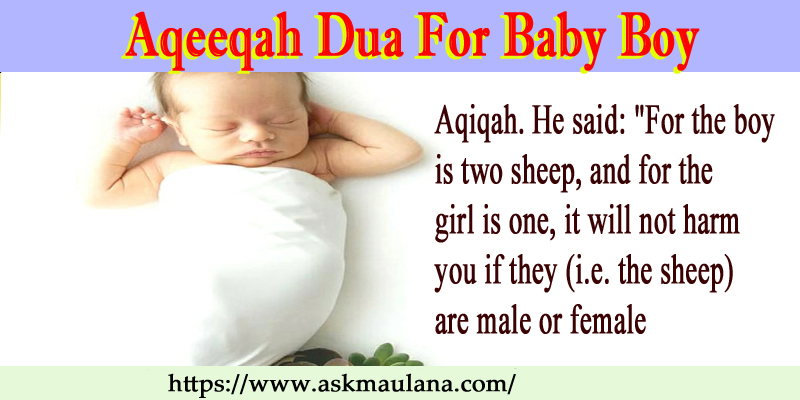Aqeeqah Dua in Shia Islam: A Blessed Ritual of Gratitude and Protection
Aqeeqah is a significant Islamic ritual where Muslims sacrifice an animal to celebrate the birth of a new baby, often performed seven days after the baby’s arrival. This practice is not only prevalent in Islamic societies globally but also has Shi’a roots because the Prophet Muhammad went through the process of Aqeeqah. Along with the sacrificial tradition, there is also an essential aspect of this ritual: the recitation of the Aqeeqah Dua. This dua is an integral part of the Aqeeqah ceremony and is critical to the Shia. This blog post will explore the power, significance, and deep-rooted traditions of reciting Aqeeqah Dua in Shia.
Shia Muslims attach great importance to the Aqeeqah Dua because it is considered a form of barakah (blessings), an essential element in Islamic traditions. When recited, this dua calls upon Allah to bless the child and the family with abundance, prosperity, health, knowledge, and safety. It is considered the first form of supplication for the newborn, which becomes a parent’s duty. The tradition of reciting the Aqeeqah Dua is rooted in Islamic history and forms a crucial part of celebrating life and creation.
The Shia community believes this dua is a crucial way to seek blessings for the newborn and the family. The Aqeeqah Dua is not just a recitation of words but a powerful tool to connect with the Almighty Allah, seeking His mercy and blessings. This dua’s recitation helps purify the environment around the newborn and creates an aura of tranquillity and peace.
According to Shia traditions, the Aqeeqah Dua can repel evil, illness, and misfortunes that may befall the family. It is said that the recitation of this dua helps create a spiritual aura around the newborn that protects it from any negative energies. Moreover, this dua is recited as part of the child’s Islamic education and is one of the first lessons a child learns.
Reciting the Aqeeqah Dua is not just a formality or a tradition but creates a sense of community and togetherness during the celebration. The dua recitation is often done with family members and close friends, which allows people to come together, interact, and offer blessings and good wishes to the newborn. This practice strengthens social and familial bonds and is essential to Islamic culture.
In Shia Islam, Aqeeqah refers to the religious sacrifice offered for the birth of a child. It is a significant event for parents, as it is an opportunity to express gratitude to Allah for the blessed gift of a newborn. During this ceremony, the parents recite a special Aqeeqah Dua, seeking the divine blessing and protection for their child. The dua is typically recited in Arabic, with the parents invoking Allah to shower their child with His mercy and bestow upon them a life filled with piety, wisdom, and good character. The Aqeeqah Dua in Shia Islam is a beautiful way for parents to express their hopes and aspirations for the spiritual well-being and success of their child.
Strengthening the Spiritual Bond: Powerful Dua to Bring You Closer to Allah
Steps To Process Aqeeqah Dua Shia
In Shia Islam, performing the Aqeeqah ritual involves specific steps. Here is a simplified guide to the process:
- Intention (Niyyah): Start by intending to perform Aqeeqah for your newborn child out of obedience and devotion to Allah.
- Choosing The Animal: Purchase a healthy sheep, lamb, or goat. The animal should be free from visible defects and of the appropriate age, typically more than one year for a sheep or goat and more than two years for a cow or camel.
- Slaughtering The Animal: The animal should be slaughtered in the name of Allah, and it should be done swiftly and humanely to minimize the animal’s suffering.
- Recitation of Dua: After slaughtering the animal, recite the Aqeeqah dua. “O Allah, this Aqeeqah is from You and for You on behalf of my child.”
- Distribution of The Meat: The meat from the animal should then be divided into thirds. One-third is for the family, one-third for friends, and one-third for the poor and needy.
- Celebration of The Child: The Aqeeqah also serves to celebrate the newborn. Friends and family are invited to the celebration, often marked by a meal using the slaughtered animal’s meat.
Remember, although Aqeeqah is highly recommended in Islam, it is not obligatory. It is a Sunnah of the Prophet Muhammad (PBUH) and a way to express gratitude to Allah for the gift of a child.
The Power of Dua for Parents – How to Pray for the Well-being and Blessings of Your Parents

Aqeeqah Dua For Girl
Aqeeqah dua for girls is an essential Islamic tradition to celebrate the birth of a newborn. This sacred ceremony includes many rituals, including slaughtering a sacrificial animal and reciting specific prayers. The cheetah dua for girls is an essential part of this celebration, as it seeks to bless the child with health, success, and prosperity. It is a beautiful way to thank Allah for the gift of life and seek His protection and guidance for the child’s future. As parents, we are responsible for performing this ceremony according to Islamic traditions and raising our children with faith, goodness, and righteousness.
Dua for Husband Back – How to Make Your Relationship Stronger
Steps To Process Aqeeqah Dua For Girl
Here are the steps to process the Aqiqah dua for a girl:
- Start with a clean body and mind: Cleanse yourself physically and mentally before you start the prayer. This could involve bathing (ghusl) and ensuring your clothes and the space you’re praying in is clean.
- Begin with the ‘Takbeer’: This is the phrase “Allahu Akbar” (God is Great). Raise your hands to your ears and say this phrase to start your prayer.
- Recite the ‘Thana’: This is a phrase of praise to Allah. You can say “Subhanak-Allaahumma wa bihamdika wa tabaarakasmuka wa ta’aalaa jadduka wa jalla thanaa’uka wa laa ilaaha ghairuk”.
- Recite Surah Al-Fatiha: This is the opening chapter of the Quran and is recited in every unit of the Muslim prayer.
- Make Dua for the child: Here, you specifically pray for the well-being of the girl for whom the Aqiqah is being performed. You can say, “O Allah, this Aqiqah is from me for my daughter (mention her name), her meat for my meat, her blood for my blood, her skin for my skin, her hair for my hair. O Allah, replace her for me.”
- End with the ‘Tasleem’: This phrase, “As-salamu’ Alaykum” (peace be upon you), is said to end the prayer, first turning to your right and then to your left.
Remember, these steps should be performed with a sincere heart and complete faith in Allah’s blessings.
The Power of Wazifa for Court Case – Help from Above
Aqeeqah Dua For Boy
The cheetah ceremony is an essential celebration in Islam and expresses gratitude and joy for the birth of a new baby. During this special occasion, aqeeqah duas are recited for the newborn to seek Allah’s blessings and protection. For those blessed with a baby boy, the aqeeqah duas are of immense significance. Reciting these prayers is believed to bless the baby boy with health, prosperity, and happiness. As such, parents are encouraged to recite the aqeeqah dua for the Boy during the aqeeqah ceremony and beyond as their precious little bundle of joy grows older.
Powerful Wazifa for Job Promotion: Tips You Need to Know
Steps To Process Aqeeqah Dua For Boy
Performing AqeeBoy is a sunnah in Islam, typically done to celebrate the birth of a new child. If you are processing an Aqeeqah dua for a boy, follow these steps:
- Start by making Wudu the cleansing process before prayers.
- Stand facing the Qibla.
- Begin with the Takbeer by saying “Allahu Akbar.”
- Recite Surah Al-Fatiha followed by any other Surah from the Quran.
- Proceed to Ruku, saying “Allahu Akbar”, then stand up straight and say “Sami Allahu liman hamidah, Rabbana lakal hamd”.
- Go into Sujood and say “Subhaana Rabbiyal A’laa”.
- Sit up from Sujood and say “Allahu Akbar,” then go into Sujood again and repeat “Subhaana Rabbiyal A’laa.”
- Stand up for the second rakat and repeat steps 4 to 7.
- After the second Sujood in the second rakat, sit up and recite the Tashahhud, and then end the prayer with the Tasleem by saying “As-salaamu’ alaykum wa rahmat-Allah.”
- After the prayer, make a dua for the newborn Boy, asking Allah to bless, protect, and guide him throughout his life.
Remember that the specifics can vary based on traditions and practices, so it’s always best to consult with a knowledgeable person or Imam in your community.
Aqeeqah Dua For Baby Boy
Welcoming a new addition to the family is truly a joyous occasion. As a way of showing gratitude and bringing blessings to the arrival of a baby boy, parents often hold an aqeeqah ceremony. Along with the celebration comes reciting an aqeeqah dua for a baby boy. This prayer seeks Allah’s blessings and protection over the newborn and offers gratitude for life’s precious gift. The cheetah dua is a heartfelt expression of love and devotion towards the family’s newest member. It is a beautiful tradition carried out for generations, symbolizing the strong faith that bonds us all together.
The Ultimate Guide to Ruqyah for Marriage Evil Eye
Steps To Process Aqeeqah Dua For Baby Boy
- Begin by performing ablution (Wudu) to cleanse yourself before the prayer.
- Stand facing the Qibla. This is the direction of the Kaaba in Mecca, which Muslims face during prayer.
- Start your prayer (Salat) by raising your hands to your ears and saying “Allahu Akbar” (God is the Greatest).
- Recite Surah Al-Fatiha, followed by another Surah or verses from the Quran.
- Proceed by saying “Allahu Akbar,” then bow in the Ruku position.
- Stand up from Ruku, saying “Sami Allahu liman hamidah” (Allah hears those who call upon Him).
- Then, perform two prostrations, or Sajdah, saying “Allahu Akbar” as you go in and get up from each prostration.
- Repeat steps 4-7 for the second Raka’ah (unit of prayer).
- After the second Sajdah of the second Raka’ah, sit on your left leg while keeping your right foot upright and hold your right shin with your right hand. Say the Tashahhud: “Atthayyatu lillahi wassalawatu wattayyibat…”.
- Conclude your prayer by turning your face to the right and then to the left, saying “Assalamu alaikum wa rahmatullah” (Peace and mercy of Allah be upon you) each time.
Remember, the Aqeeqah dua is best performed after the Salat (prayer). After finishing the prayer and making the dua, a goat or sheep should be sacrificed. This is traditionally done on the 7th, 14th, or 21st day after the baby boy’s birth.
The Power of Dua for Someone Madly in Love with You
What Is Aqeeqah?
Aqeeqah is a practice observed by Muslims worldwide. But for those who are not familiar, what exactly is cheetah? Aqeeqah is a traditional Islamic practice of sacrificing an animal in celebration of a newborn child. It is an important event that signifies gratitude towards Allah for the arrival of a new life and is typically performed by parents of a newborn within a week of their child’s birth. Aqeeqah is a blessed act that brings joy, prosperity, and protection to the newborn. It is also an opportunity for families to gather and share a meal with friends and loved ones. In short, cheetah is a beautiful tradition that showcases the importance of family, community, and gratitude in Islamic culture.
Discover the Qad Shaghafaha Hubban Wazifa for Eternal Love
How To Calculate Aqeeqah Day?
Are you looking to calculate an Aqeeqah day? It might seem not very easy, but it’s pretty simple. First, determine the birth date of the child. Then, count seven days from the birth date. This will be the day of the Aqeeqah. Prepare enough food and invite family and friends to celebrate this joyous occasion. The Aqeeqah is a significant Islamic tradition that symbolizes gratitude to Allah for blessing a newborn. It’s a beautiful way to show Thanksgiving and share gifts with others. So, don’t let the calculations worry you, and focus on the celebration!
The Importance of Making Dua for Kafir Death
Dua For Aqeeqah
The cheetah is a unique tradition in Islam where the birth of a child is celebrated by sacrificing an animal and sharing the meat with friends and family. This celebration also includes reciting the dua for aqeeqah, which is a supplication to Allah thanking Him for blessing a healthy child. The dua also seeks His protection and guidance for the newborn. It is a beautiful moment where the love and joy of welcoming a new life into the world is combined with profound gratitude and reverence for Allah. The dua for aqeeqah is a reminder of the unbreakable bond between family, community, and faith.
Understanding the Significance of “Rabbi Inni Lima Anzalta Wazifa”
Steps To Process Dua For Aqeeqah
The Aqeeqah is an Islamic tradition that involves sacrificing an animal on the occasion of a child’s birth. Here are the steps to process the dua (prayer) for Aqeeqah:
- Begin with the declaration of your intention (Niyyah): State in your heart that you are performing the dua for Aqeeqah on behalf of your child.
- Recite the Shahada: There is no God but Allah, and Muhammad is His messenger.
- Recite the Dua: “O Allah, this Aqeeqah is from me and is for You on behalf of my child (mention the child’s name). O Allah, accept it on behalf of my child.”
- Make Dua for your child: Ask for Allah’s blessings, guidance, and protection.
- End with Salam: Finish the prayer by saying, “As-salamu Alaikum wa Rahmatullahi wa Barakatuh” (Peace, mercy, and blessings of Allah be upon you).
The Power of Dua for Converting to Islam
Conclusion About Aqeeqah Dua in Shia
In conclusion, we have discussed the power and significance of the Aqeeqah Dua in Shia Islam. This dua is more than a simple recitation of words; it is a powerful means of seeking Allah’s blessings for the newborn and the family. The Aqeeqah Dua is a beautiful Islamic tradition that symbolizes the celebration of life and creation and creates an atmosphere of happiness, community, and togetherness. This blog post helped shed light on the significance of the Aqeeqah Dua and provided insight into Shia Islam’s rich and vibrant culture.






